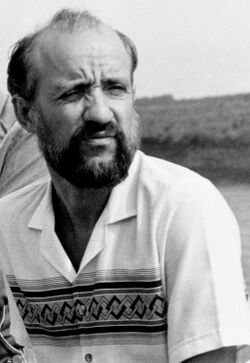Arthur Winfree
Topic: Biography
 From HandWiki - Reading time: 2 min
From HandWiki - Reading time: 2 min
Arthur Winfree | |
|---|---|
 Arthur Winfree in 1983 | |
| Born | May 15, 1942 St. Petersburg, Florida, United States |
| Died | November 5, 2002 (aged 60) |
| Nationality | American |
| Awards | Norbert Wiener Prize in Applied Mathematics |
| Scientific career | |
| Fields | Theoretical Biology |
| Institutions | University of Arizona |
Arthur Taylor Winfree (May 15, 1942 – November 5, 2002) was a theoretical biologist at the University of Arizona.[1] He was born in St. Petersburg, Florida, United States.[2]
Winfree was noted for his work on the mathematical modeling of biological phenomena (see Complexity and Singularity (system theory)): from cardiac arrhythmia and circadian rhythms to the self-organization of slime mold colonies and the Belousov–Zhabotinsky reaction. Winfree was a MacArthur Fellow from 1984 to 1989, he won the Einthoven Prize for his work on ventricular fibrillation, and shared the 2000 Norbert Wiener Prize in Applied Mathematics[3] with Alexandre Chorin.
He was the father of Erik Winfree, another MacArthur Fellow and currently a professor at the California Institute of Technology, and Rachael Winfree, currently a professor in the Department of Ecology, Evolution and Natural Resources at Rutgers University.
The Arthur T. Winfree Prize was established by the Society for Mathematical Biology in his honor.[4]
Career
Professorial history
- 1965 Bachelor of Engineering Physics, Cornell University
- 1970 Ph.D. in biology, Princeton University
- 1969–1972 Assistant professor, University of Chicago
- 1972–1979 Associate professor of biological sciences, Purdue University
- 1979–1986 Professor of biological sciences, Purdue University
- 1986–2002 Professor of ecology and evolutionary biology, University of Arizona
- 1989–2002 Regents Professor, University of Arizona
Awards and honors
| Year | Award |
|---|---|
| 1961 | Westinghouse Science Talent Search Finalist |
| 1982 | John Simon Guggenheim Memorial Fellowship |
| 1984 | John D. and Catherine T. MacArthur Prize |
| 1989 | The Einthoven Award (Netherlands Royal Academy of Science, InterUniversity Cardiology Institute, and Einthoven Foundation) |
| 2000 | AMS-SIAM Norbert Wiener Prize in Applied Mathematics, "in recognition of his profound impact on the field of biological rhythms, otherwise known as coupled nonlinear oscillators"[5] (shared with A. Chorin) |
| 2001 | Aisenstadt Chair Lecturer (Centre de Recherche Mathématiques, Université de Montréal) |
Publications
- Arthur T. Winfree (2001). The Geometry of Biological Time. Springer-Verlag. ISBN 0-387-98992-7. (Second edition, first edition published 1980).[6]
- Arthur T. Winfree (1987). When Time Breaks Down: The Three-Dimensional Dynamics of Electrochemical Waves and Cardiac Arrhythmias. Princeton University Press. ISBN 0-691-02402-2.
- Arthur T. Winfree (1987). Timing of Biological Clocks. Scientific American Library, No 19. ISBN 0-7167-5018-X. https://archive.org/details/timingofbiologic00winf.
- Editorial (2004). Arthur T. Winfree (1942–2002). Journal of Theoretical Biology, No 230. pp. 433–439.
References
- ↑ Johnson, George (November 22, 2002). "Dr. Art Winfree, 60, Dies; Plumbed the Rhythms of Life". New York Times. https://www.nytimes.com/2002/11/22/us/dr-art-winfree-60-dies-plumbed-the-rhythms-of-life.html.
- ↑ "Arthur Winfree obituary". SIAM News. http://www.siam.org/news/news.php?id=289.
- ↑ Strogatz, Steven (June 2003). "Obituary: Arthur Taylor Winfree". Physics Today 56 (6): 74–75. doi:10.1063/1.4776726.
- ↑ "Arthur Winfree Prize". Society for Mathematical Biology. https://www.smb.org/arthur-winfree-prize/.
- ↑ "2000 AMS–SIAM Wiener Prize". Notices of the AMS 47 (4): 483–484. 2000. ISSN 0002-9920. https://www.ams.org/notices/200004/comm-wiener.pdf. Retrieved December 28, 2022.
- ↑ Cohen, Joel E. (1982). "Review: The geometry of biological time, by Arthur T. Winfree". Bull. Amer. Math. Soc. (N.S.) 7 (1): 280–283. doi:10.1090/s0273-0979-1982-15036-4. https://www.ams.org/journals/bull/1982-07-01/S0273-0979-1982-15036-4/S0273-0979-1982-15036-4.pdf.
 |
 KSF
KSF